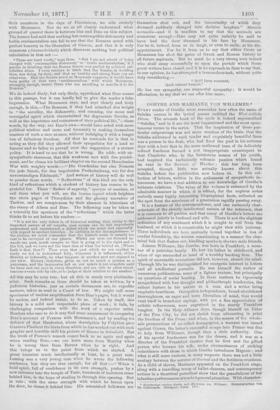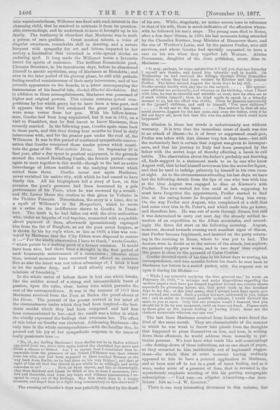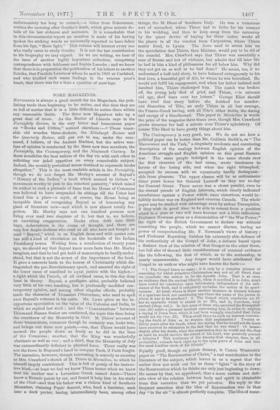GOETHE AND MARIANNE VON WILLEMER.*
EVERY reader of Goethe must remember how often the name of Suleika occurs in the lyrical poems entitled the West-aviliche Divan. The seventh book of the cycle is indeed superscribed 44 Suleika," and in it are the most impassioned and the most spon- taneous verses in the series. That the inspiration of these par- ticular outpourings was not some creation of the brain, that the- Suleika addressed in such tender and exquisitely beautiful lines was a person in the flesh, who had fired the poet in his autumn days with a love that in the more mellowed tone of its delicately refined fondness formed a not inappropriate counterpart to that Charlotte who, in the boisterous season of bis youth, had inspired the turbulently volcanic passion which found its vent in the Sorrows of Werther ; this has long been accepted, though little was actually known about this Suleika before the publication now before us. In this col- lection of letters, written in the artlessness of sympathetic in- tercourse, we have a real addition to our knowledge of Goethe's intimate relations. The value of the volume is enhanced by the admirable manner in which it is edited, for the copious notes✓ embody many highly interesting biographical facts, collected on the spot from the survivors of a generation rapidly passing away..
It is a feature of the correspondence, and 'one eminently char- acteristic of the strictly intellectual nature of the intimacy, that it is common to all parties, and that many of Goethe's letters are addressed jointly to husband and wife. There is not the slightest indication of any sentiment which it is sought to veil from the husband, or which it is conceivable he might view with jealousy. Three individuals are here mutually bound together in ties of cordial friendship, the woman constituting in a manner the elec- trical link that flashes out, kindling sparks in the two male friends.
Johann Willemer, like Goethe, was born in Frankfort, a mem- ber of a patrician family. He lost his father in childhood, and when of age succeeded as head of a wealthy banking firm. The spirit of mercantile avocations did not, however, absorb his mind.. Through life he was distinguished for energetic interest in letters and all intellectual pursuits. He was himself the author of numerous publications, some of a lighter texture, but principally on questions of social bearing. In these matters he vigorously sympathised with free thought and philanthropic tendencies, the salient feature in his nature as a man and a writer being- emphatic heartiness. Outspoken independence, broad-shouldered thoroughness, an eager and terse liberalism of mind, that would' vent itself in trenchant sayings, with yet a fine appreciation off artistic refinements, were engrained in the sturdy Frankfort burgher. In the Holy-Alliance days, though himself an Elder of the Free City, he did not shrink from advocating in print the freedom of the Press ; and when, in the season of the whole- sale prosecutions of so-called demagogues, a warrant was issued against Gaffes, the latter's successful escape into France was due to help from Willeiner, though then a civic authority. One of his special formlnesses was for the drama, and it was as a director of the Frankfort theatre that he first met the gifted person who became his wife, under circumstances of striking, coincidence with those in which Goethe introduces Mignon ; and what is still more curious, in many respects there was not a little analogy between the natures of the real and the fictitious creations. As a child of eleven, Marianne appeared on the Frankfort stage, along with a travelling troop of ballet-dancers, and contemporary notices in a theatrical periodical show that the gracefulness of her infantine performances attracted general attention. With character- * Briefwechsel zwichen Goethe und.Marianne von Willemer. Ileravegogeben von Th. Oreizenach. Stuttgart: Cotton 1877.
idle warmheartedness, Willemer was fired with such interest in the charming child, that he resolved to extricate it from its question- able surroundings, and he undertook to have it brought up in his
family. The testimony is abundant that Marianne was in truth a person of rare qualities. Great musical talents, a voice of
singular sweetness, remarkable skill in drawing, and a nature buoyant with sympathy for art and letters, imparted to her society a fascination that exercised in wide-spread circles an
enduring spell. It long made the Willemer house a favourite haunt for spirits of eminence. The brilliant Romanticist poet,
Clematis Brentano, in his tumultuous days, before he abandoned himself to ascetic mysticism, sang of Marianne as Biondetta ; and even in the later period of his gloomy phase, ho still with pathetic feeling recalled reminiscences of their early intercourse, and of her juvenile appearance on the boards, in a letter accompanying the transmission of his fanciful tale, Gockel-Hinckel-Gackeleisa. But in addition to these accomplishments, Marianne was possessed of higher and original powers. This volume contains lyrical com- positions by her which prove her to have been a true poet, and it appears that what first awakened the great poet's interest were some verses from her pen. With his fellow-towns- man, Goethe had been long acquainted, but it was in 1814, on a visit to Frankfort, that he first learnt to know Marianne, then
recently married. In the following year, Goethe again came back to these parts, and this time during four months he lived in daily intercourse with, and for the greater part under the roof of, the Willemers. It was in this period of continued sympathetic conver- sation that Goethe composed those tender poems which consti- tute the gems of the West-ostliche Divan. On September 20 in that year, after a day spent in poetical enjoyment, in the grounds around the ruined Heidelberg Castle, the friends parted—never again to meet together in this world—though to the last an active interchange of letters testified to the undying interest which
united these three. Goethe never saw again Marianne, never revisited his native city, with which he had ceased to have family ties. All his biographers tell a story of how, on this occasion the poet's presence had been honoured by a gala performance of his Tasso, when he was crowned by a wreath ;
and Mr. Lewes likens the ovation to that given to Voltaire in the Tht1ttre Francais. Nevertheless, the story is a hoax, due to a squib of Willemer's in the Morgenblatt, which he wrote as a satire on the indifference shown to Goethe in Frank-
fort. The truth is, he had fallen out with the civic authorities who, under an impulse of red-tapeisra, connected with a squabble about payment of dues, afterwards ignominiously expunged him from the list of Burghers, an act the poet never forgave, as is shown by his icy reply when, as late as 1829, a hint was con-
voyed by Marianne that the City Elders were disposed to restore it :—" For the kindly observation I have to thank," wrote Goethe, 4' which points to a making good of a former omission. It would have been nice, had there been a thought in the first period of such honourable maintenance of a connection ; likewise since then, several moments have occurred that offered an occasion.
But as also the latest was not taken advantage of, I think it best to let the matter drop, and I shall silently enjoy the happy relations of friendship." In the whole series of letters there is but one which breaks, like the sudden sound of a rising and uncontrollable burst of passion, upon the calm, clear, balmy tone which pervades the rest of the correspondence. It was in the summer of 1819 that Marianne received from the Poet at Baden the proof-sheets of the Divan. The perusal of the poems revived in her mind all the circumstances under which they had been inspired—the inci- dents amidst which they had been composed and had first been communicated to her—and the result was a letter in which
she vividly expressed the feelings that overcame her. The effect of this letter on Goethe was electrical. Addressing Marianne—the
only time in the whole correspondence—with the familiar thou, he poured out his joy at her sympathetic response in the tones of really passionate love :—
" No, oh, my darling Marianne 1 thou sballat not bo in Baden without one word from me, since thou again lotted thy cherished lips move and break a silence so dismal. Am I to repeat that I considered thee in- separable from the presence of our friend [Willemer was then absent from his wife, and had boon expected to have touched Weimar on the 'way back from Berlin, as he had done on his way thither], and that at sight of him all that was stirred in me which he so willingly and nobly
concedes to us? Now, as thou sayest, and this so charmingly, that thou thinkest and likest to think of me, so here I announce, two- fold and threefold, that from my heart and without intermission I re- spond to every one of thy feelings. May this reach thee in a happy moment, and impel thee to a right long commentary on this short text'."
The evening of Goethe's days was painfully clouded by the death
of his son. While, singularly, no notice occurs here in reference to that of his wife, there is much indicative of the affection where-
with he followed his eon's steps. The young man died in Rome, after a few days' illness, in 1830, his last moments being attended
by the Chevalier Kiistner, long Minister of Hannover there, and the son of Werther's Lotte, and by the painter Preller, who still survives, and whom Goethe had specially requested to have a
care on his son when they together left Weimar. Alwine Frommann, daughter of the Jena publisher, wrote thus to Marianne :-
" It may, perhaps, be some satisfaction if I tell you that last Saturday I myself saw Goethe, and found him tolerably well in health. On Wednesday he had received the tidings, through Privy Councillor Muller, to whom they had been written by Hastuer and the painter
Preller. The latter nursed August the three days ho lay sick Goethe speaks hardly with any one on the subject His appear- ance affected mo profoundly, and whereas on his birthday, when I dined with him, he was as cheerful and amiable as ever, now he often sat as if sunk within himself ; then he tried again to speak in a friendly manner to us, but the effort was visible. Often he glanced sorrowfully at the [grand] children, and said to himself, Yon poor children I' It cut me to the heart The saddest is, that all who
could observe August for the last year, and even the father, even if he did not know all, must feel that this was the mildest which could have happened."
The allusion in these last words is unfortunately not without warranty. It is true that the immediate cause of death was due to an attack of illness—be it of fever or suppressed small-pox, Preller was taken with that disease very few days later—but still the melancholy fact is certain that August was given to intemper- ance, and that his journey to Italy had been prompted by the father with the secret hope of thereby effecting a break in evil habits. The observation about the father's probably not knowing all, finds support in a statement made to us by one who knew August well, that he had himself never seen him the worse for liquor,
and that he used to indulge privately by himself in his own room at night. As to the circumstances attending his last days, we have had the following details from the lips of one who was with him at the time August was engaged to dine at Kiistner's with Preller. The two waited for him until at last, supposing he must have forgotten the appointment, Preller started to find him at the eating-house he frequented and bring him away.
On the way Preller met August, who complained of a chill that had come over him in St. Peter's, and which made him go home, and therefore late. He was out of sorts through dinner, but still it was determined to carry out next day the already settled in- tention of an expedition to the Alban mountains, and accord- ingly the three did start on the following morning. August, however, showed towards evening such manifest signs of illness,
that Preller became frightened, and insisted on the party return-
ing in the morning to Rome, where ho was put to bed. The doctors were in doubt as to the nature of the attack, but anyhow, the patient rapidly grew worse, and in two days' time expired. Ilia grave is close to the pyramid of Caius Goethe devoted much of his time in his latest days to sorting his correspondence, and two months before his death he sent back to Marianna her letters in a sealed packet, with the request not to
open it during his lifetime:- " While I am earnestly applying the time granted me," he wrote on February 10, 1832, " to arrange and make dispositions regarding the endless papers that have got heaped together around me, certain sheets especially lie glistening before me, that point back to the loveliest days in my life ; of this kind many, that I always have kept apart, now are packed and sealed. Such a packet lies now, addressed to you, before me ; and in order to forestall possible accidents, I would forward the same to you at once. Only this one promise would I demand, that you should lot it lie by you unopened, until an hour not fixed. Papers such as these give us the joyous fooling of having lived; these are the choicest memorials whereon one can rest."
The last lines Marianne received from Goethe were dated the 23rd of the same month. They are characteristic of the manner in which he was wont to throw into plastic form the thoughts that happened to press themselves on him, and how, in writing down these effusions, he would address them inwardly to par- ticular persons. We here have what reads like self-communings —the dotting-down of three reflections, set on one sheet of paper, as they occurred to him incidentally out of haphazard sugges-
tions—the whole then at some moment having suddenly appeared to him to have a pointed application to Marianne, and so been sent off to her in a gush of inner feeling, and as it were, under sense of a pressure of time, that is revealed in the mysteriously emphatic wording of this his parting autographic subscription :—" Und nun—zu eiligster Absendung—das treu- lichste : fort an !—J. W. GOETHE."
There is one very interesting document in this volume, but
unfortunately too long to extract,—a letter from Eckermann, written the morning after Goethe's death, which gives minute de- tails of his last sickness and moments. It is remarkable that in this circumstantial report no mention is made of his having spoken the striking words so universally reported to have fallen from his lips, "More light." This volume will interest every one who really cares to study Goethe. It is not the last contribution to his biography we may expect. As we are writing, we hear of the issue of another highly important collection, comprising correspondence with Schlosser and Sophie Laroche ; and we know that there is in preparation the publication of his letters to another Suleika, that Fraulein Levetzow whom he met in 1823 at Carlsbad, and who kindled such warm feelings in the veteran poet's heart, that there was for a time a question of marriage.








































 Previous page
Previous page